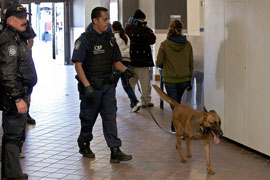Court voids marijuana conviction on questions about drug-sniffing dog

Cronkite News
WASHINGTON – A federal appeals court Thursday overturned the 2011 conviction of an Arizona man caught with 150 pounds of marijuana in his truck, saying police withheld information about the reliability of the dog that discovered the drugs.
A three-judge panel of the 9th U.S. Circuit Court of Appeals rejected several other challenges by Jonathan Thomas, including his claim that the drug-sniffing dog violated his right to privacy by putting his paws and nose on the truck.
But the court agreed that records on the reliability of the dog, Beny-A, and his handler were so heavily edited that Thomas’ efforts to challenge admissibility of the drug evidence were “hamstrung.”
Assistant Federal Public Defender Brian Rademacher, who argued for Thomas, said he respects the court’s decision but was disappointed by its conclusion on the use of drug-detection dogs and trespass.
Assistant U.S. Attorney Bruce M. Ferg declined to comment Thursday.
The case began on the afternoon of Feb. 28, 2010, when Thomas approached a U.S. Border Patrol checkpoint on a southern Arizona highway. Beny-A went into “alert behavior” – his tail went up, his posture and breathing changed, the court opinion said.
His handler, Border Patrol Agent Christopher LeBlanc, walked Beny-A around Thomas’ truck. At LeBlanc’s direction, the dog jumped up and put his paws on the truck and pressed his nose against its toolbox. Beny-A then tried to sit back, which dogs are trained to do when they detect contraband.
LeBlanc then got Thomas’ keys and searched the locked toolbox, where he found bundles of marijuana.
Thomas was indicted in March 2010 on a charge of possession of marijuana with intent to distribute. A superseding indictment more than a year later, in May 2011, charged him with conspiracy.
Thomas tried to have the marijuana evidence thrown out, claiming the search had violated his Fourth Amendment rights. When that failed, Thomas admitted he had drugs in his truck, but testified at trial that he did so under duress, after a man with a gun threatened him.
He was convicted of conspiracy after a two-day jury trial, and sentenced to 2.5 years in prison and three years on probation.
On appeal, Thomas first argued that his right to a speedy trial was violated. The court disagreed, saying the 70-day trial clock started anew with the superseding indictment.
He raised three claims about the search, including the claim about Beny-A touching the truck. While the government called that claim “frivolous,” the court said it was not so clear-cut as a result of recent Supreme Court decisions. But it also said that because LeBlanc was following precedent in place at the time, the search was not unconstitutional.
Rademacher disagreed.
“There was no prior law that allowed a police officer to use his dog in this way to trespass on a vehicle like this to gain information,” he said.
The court rejected Thomas’ claim that because Beny-A had not been allowed to sit, indicating contraband, LeBlanc did not have probable cause to search the toolbox. The judges said “evidence from a trained and reliable handler about alert behavior he recognized in his dog can be probable cause.”
But the court agreed with Thomas’ third claim.
To assess Beny-A’s reliability, Thomas sought training records of the dog and LeBlanc. At least one entry indicated a near-failing score for the team. But most pages had blacked-out paragraphs, leaving documents so heavily edited that “the defendant, the district judge, this court and even the Border Patrol’s custodian of records are entirely in the dark,” the panel said.
It reversed and ordered the case back to district court.
Rademacher said such records are important and that “the government can’t withhold certain records” if the defense is trying to assess dog reliability.
“These records possibly may show the dog or the handler is unreliable in terms of the way they did the search-sniffing in this case,” he said.
Rademacher said his team has not decided whether to challenge the finding that Beny-A did not trespass on the truck.
“We may fight on with the Court Appeals, but there are all the things we need to think about. It’s too early to tell,” Rademacher said.















